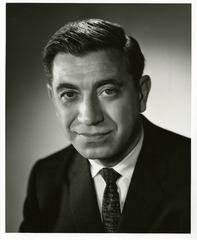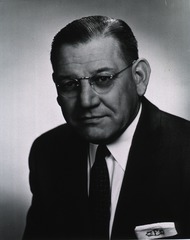Edwin Fuller Torrey, is an American psychiatrist and schizophrenia researcher. He is associate director of research at the Stanley Medical Research Institute (SMRI) and founder of the Treatment Advocacy Center (TAC), a nonprofit organization whose principal activity is promoting the passage and implementation of outpatient commitment laws and civil commitment laws and standards in individual states that allow people diagnosed with severe mental illness to be involuntarily hospitalized and treated throughout the United States.
The National Institute of Mental Health (NIMH) is one of 27 institutes and centers that make up the National Institutes of Health (NIH). The NIH, in turn, is an agency of the United States Department of Health and Human Services and is the primary agency of the United States government responsible for biomedical and health-related research.
Loren Richard Mosher was an American psychiatrist, clinical professor of psychiatry, expert on schizophrenia and the chief of the Center for Studies of Schizophrenia in the National Institute of Mental Health (1968–1980). Mosher spent his professional career advocating for humane and effective treatment for people diagnosed as having schizophrenia and was instrumental in developing an innovative, residential, home-like, non-hospital, non-drug treatment model for newly identified acutely psychotic persons.

Carola Blitzman Eisenberg was an Argentine-American psychiatrist who became the first woman to hold the position of Dean of Students at the Massachusetts Institute of Technology. From 1978 to 1990, she was the dean of student affairs at Harvard Medical School (HMS). She was a long-time lecturer in the Department of Global Health and Social Medicine at HMS. She was also both a founding member of Physicians for Human Rights and an honorary psychiatrist with the Massachusetts General Hospital in Boston. After retiring, she was involved in human rights work through Physicians for Human Rights, the Institute for Healthcare Improvement, and elsewhere. She turned 100 in September 2017 and died in Lincoln, Massachusetts, in March 2021 at the age of 103.

The National Mental Health Act (1946) became law on July 3, 1946. It established and provided funds for a National Institute of Mental Health (NIMH).
Frederick King Goodwin was an American psychiatrist and Clinical Professor of Psychiatry at the George Washington University Medical Center, where he was also director of the Center on Neuroscience, Medical Progress, and Society. He was a specialist in bipolar disorder and recurrent depression.
Steven Edward Hyman is Director of the Stanley Center for Psychiatric Research at the Broad Institute of MIT and Harvard in Cambridge, Massachusetts. He is also Harvard University Distinguished Service Professor of Stem Cell and Regenerative Biology. Hyman was Provost of Harvard University from 2001 to 2011 and before that Director of the U.S. National Institute of Mental Health (NIMH) from 1996 to 2001. Hyman received the 2016 Rhoda and Bernard Sarnat International Prize in Mental Health from the National Academy of Medicine for "leadership in furthering understanding and treatment of psychiatric disorders as biological diseases".

Thomas Roland Insel is an American neuroscientist, psychiatrist, entrepreneur, and author who led the National Institute of Mental Health (NIMH) from 2002 until November 2015. Prior to becoming Director of NIMH, he was the founding Director of the Center for Behavioral Neuroscience at Emory University in Atlanta, Georgia. He is best known for research on oxytocin and vasopressin, two peptide hormones implicated in complex social behaviors, such as parental care and attachment. He announced on Sept. 15, 2015, that he was resigning as the director of the NIMH to join the Life Science division of Google X. On May 8, 2017, CNBC reported that he had left Verily Life Sciences. Insel is a Co-founder with Richard Klausner and Paul Dagum of a digital mental health company named "Mindstrong," a Bay-area startup. He has also co-founded Humanest Care, NeuraWell Therapeutics, and MindSite News and is a member of the scientific advisory board for Compass Pathways, a company that is developing the psychedelic drug psilocybin to treat depression and other mental health disorders. His book, Healing: Our Path from Mental Illness to Mental Health was published by Penguin Random House in February, 2022.

Jeffrey Alan Lieberman is an American psychiatrist who specializes in schizophrenia and related psychoses and their associated neuroscience (biology) and pharmacological treatment. He was principal investigator for CATIE, the largest and longest independent study ever funded by the United States National Institute of Mental Health to examine existing pharmacotherapies for schizophrenia. He was president of the American Psychiatric Association from May 2013 to May 2014.
James Frederick Leckman is an American child psychiatrist and psychoanalyst and the Neison Harris Professor of Child Psychiatry, Psychiatry, Psychology and Pediatrics at the Yale School of Medicine, recognized for his research in Tourette syndrome (TS) and obsessive–compulsive disorder (OCD).
William T. Carpenter is an American psychiatrist, a pioneer in the fields of psychiatry and pharmacology who served as an expert witness in the John W. Hinckley trial for the attempted assassination of U.S. President Ronald Reagan. His primary professional interest is in severe mental illness, especially schizophrenia, to the prevention and treatment of which he has made significant contributions in psychopathology, assessment methodology, testing of new treatments, and research ethics.
Daniel Blain, M.D. (1898–1981) was an American physician and was the first medical director of the American Psychiatric Association (APA), the first professional medical society, founded in the United States in 1844. He may be credited with the leadership which brought changes in the practice of psychiatry after World War II and in advocating the treatment for people with mental disorders.

Lori Altshuler was a professor at the University of California, Los Angeles (UCLA) Department of Psychiatry and Biobehavioral Sciences and held the Julia S. Gouw Endowed Chair for Mood Disorders. Altshuler was the Director of the UCLA Mood Disorders Research Program and the UCLA Women's Life Center, each being part of the Neuropsychiatric Hospital at UCLA.

Judith L. Rapoport is an American psychiatrist. She is the chief of the Child Psychiatry Branch at the National Institute of Mental Health (NIMH), part of the National Institutes of Health (NIH) in Bethesda, Maryland.

Stanley Fausst Yolles was an American psychiatrist who was head of the National Institute of Mental Health from 1964 to 1970. He resigned after publicly clashing with the Nixon administration over drug policy.
Bertram S. Brown was an American psychiatrist who was the head of the National Institute of Mental Health from 1970 to 1977, Assistant Surgeon General from 1978 to 1980, rear admiral in the United States Public Health Service Commissioned Corps, and president and chief executive of Hahnemann University Hospital in Philadelphia from 1983 until his retirement in 1987. He pioneered research in psychiatry, especially in mental disabilities.

Lewis Lund Judd was an American neurobiologist and psychiatrist. He served as director of the National Institute of Mental Health (NIMH) from 1988 to 1992, chair of the Department of Psychiatry at the University of California, San Diego from 1977 to 2013, and as a vice president of the American Psychiatric Association. As NIMH director he helped develop the "Decade of the Brain", a research plan designed "to bring a precise and detailed understanding of all the elements of brain function within our own lifetime."
Pamela Y. Collins is an American psychiatrist. She is the Director of the International Training and Education Center for Health (I-TECH) and the Global Mental Health Program at the University of Washington School of Medicine and School of Public Health. Collins is professor of psychiatry and behavioral sciences and of global health. She previously worked as the director of the Office for Research on Disparities and Global Mental Health at the National Institute of Mental Health (NIMH).

Karen Faith Berman is an American psychiatrist and physician-scientist who is a senior investigator and chief of the section on integrative neuroimaging, the psychosis and cognitive studies section, and the clinical and translational neuroscience branch of the National Institute of Mental Health's division of intramural research.

Joshua A. Gordon is an American neuroscientist and psychiatrist who served as the Director of the National Institute of Mental Health (NIMH) from 2016 to June 2024. He is also a senior in the Adult Psychiatry Residency Program at Columbia University Medical Center (CUMC) and the New York State Psychiatric Institute (NYSPI).










